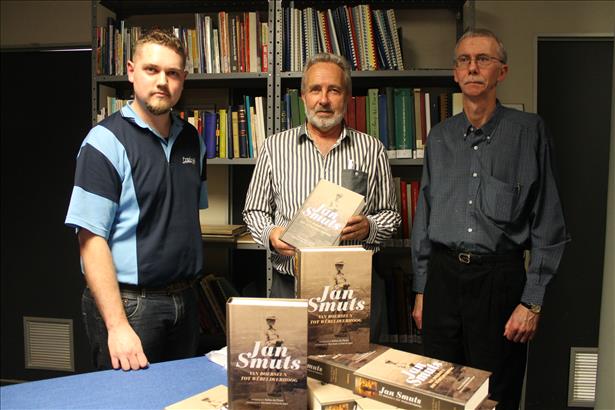Latest News Archive
Please select Category, Year, and then Month to display items
12 June 2024
|
Story Zinzi Zumana
|
Photo supplied
 UFS Lekgotla Men’s Well-being Programme: addiction dialogue encourages empowerment and exchange of ideas.
UFS Lekgotla Men’s Well-being Programme: addiction dialogue encourages empowerment and exchange of ideas.
The University of the Free State (UFS)
Division of Student Affairs hosted a ‘Dialogue on Addiction’ at the Equitas Senate Hall on 20 April 2024 as part of the UFS Lekgotla Men’s Well-being Programme. Led by the esteemed
Ace Moloi, male students’ well-being was addressed by focusing on topics relating to substance abuse, the ‘hookah pipe’, pornography, and digital addiction.
Ogaisitse Diseko, an expert on substance abuse, highlighted the misconceptions and societal impact of substances such as ‘bath salts’. Male students shared personal experiences, emphasising the need for early interventions and community backing to combat addiction.
Prof Noluxolo Gcaza, a Nelson Mandela University Professor specialising in digital wellness, presented on digital well-being, internet safety, and managing screen time. The dialogue concluded with Billy Mogadi sharing his journey from addiction to recovery, underscoring the human toll and the possibility of transformation.
Mogadi’s story resonated deeply, fostering hope and empowerment among attendees. The event highlighted the power of dialogue and support in addressing addiction issues. By promoting genuine interaction and providing the necessary tools, such initiatives contribute to community well-being and development. The UFS Lekgotla Men’s Well-being programme advances its goal of fostering healthier lives through open communication and mutual support.
Jan Smuts: from country boy to world stage; a reassessment
2017-11-10

At the book discussion of Jan Smuts: van boerseun tot wêreldverhoog;
'n herwaardering, were from the left: Con Robinson, Protea Bookshop;
Prof Kobus du Pisani; and Prof André Wessels from the Department
of History at the UFS.
Photo: Leonie Bolleurs
Prof André Wessels from the Department of History at the University of the Free State (UFS) was one of 20 co-authors of Jan Smuts: van boerseun tot wêreldverhoog; 'n herwaardering – a book compiled under the leadership of the general editor, Prof Kobus du Pisani, from North-West University. This unique history book deals with the different themes in the life of Smuts, rather than describing the events chronologically.
South Africans are almost afraid of their own history nowadays ... and yet another history book is being launched. Does it make sense? Yes, for two reasons.
The monster in the dark
One of the ways to overcome fear is through knowledge. The monster in the dark disappears when one understands that the street lights and tree branches are creating interesting shadows. The more one knows about something, the less scary it becomes.
The Greek Bible
This was possibly also Smuts’s approach. Knowledge was his passion, and even today he is considered as one of the best students of the University of Cambridge. Although very few people really understand his holism theory, Smuts experienced the complex world in a very simple way – as one – not as lots of different pieces functioning independently of each other.
Smuts could have made a success of any of his interest fields – law, botany, literature, and philosophy. However, politics laid three wars on his doorstep. While he is regarded as a militarist by some, he was actually a peacemaker. He played a role in the establishment of the League of Nations, and later the United Nations. Incidentally, he continued to read the Greek Bible while on commando during the Anglo-Boer War.
A colourful character
The second reason for yet another Jan Smuts history book is his fascinating humanness. Time should be spent on colourful characters such as this. It is worthwhile hearing the story of someone who had such a great impact locally and internationally – good or bad.